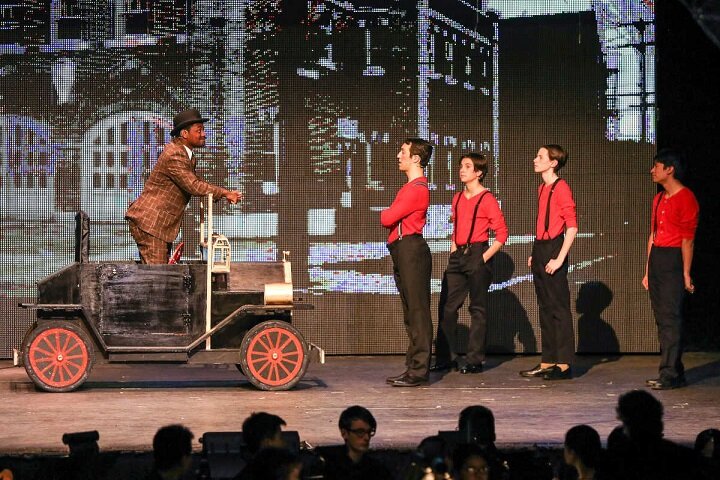Do Not Censor 'Ragtime'
Cedric Middleton as Coalhouse Walker Jr. (left) confronts firemen during "Ragtime" at Cherry Hill East High School. (STEPHEN M. Falk)
Chris Peterson, OnStage Blog Founder
Author’s note: While this article discusses the need to not censor racist slurs out of 'Ragtime’, I’ve decided to edit the slurs due to the fact that my including them in this piece isn’t the same as being heard in context on stage.
A couple of years ago, I attended a production of the musical Ragtime in Stamford, CT. Beyond just being an excellent production, there were some moments that I found particularly important and moving.
There is a scene in the musical where the character Coalhouse Walker Jr. encounters a group of firemen who harass him because he's driving a nice car. The script reads:
WILLIE CONKLIN
This ain't it. This is the Emerald Isle volunteer firehouse and this is a private road, n****r. Try turning around and going back where you came from.COALHOUSE
I can see that I am not going to receive the courtesy of an answer from you gentlemen. Good day.(He tips his hat and drives off.)
FIREMAN
Did you see that, Will? That impudent, cocky, king of the road smirk?WILLIE CONKLIN
That, gentlemen, is a man to be pitied: A n****r who doesn't know he's a n****r. If he's smart, he won't pass this way again.
When these lines were spoken, there was an audible gasp in the audience. I loved that. I loved hearing an audience of mostly white people have a visceral reaction to hearing such a hateful word being spoken in such a hateful way. I’d like to think that every audience would have a similar reaction. Which is why those words need to stay in the script, especially now.
But not everyone feels that way.
In 2016, in Cherry Hill, NJ, the local school board is moved towards censoring Cherry Hill High School's production of Ragtime, by changing or removing the word in the script. A complaint from a parent of a student involved in the show also led the local chapter of the NAACP to support the Board of Education's decision.
While the school board moved to censor the word, the decision was reversed when the licensing house, MTI, stepped in and told the board they weren’t permitted to change the script.
The show went on to perform unedited and did so to much acclaim.
But the controversy led to an interesting discussion - Is it okay for words like those to be spoken on stage? Also, is it okay for those words to be spoken on stage by high school students?
I say yes to both. But I certainly understand the arguments opposing that opinion.
These are hateful words. I will never dictate how a black person should react to hearing that word, as I would never want someone to dictate how I should feel about hearing Asian derogatory words.
However, what I feel is getting lost with this case and all similar situations, is context. The word is said nine times in the show. It's never said casually nor celebratory. It's always said with hate and ignorance, therefore allowing a teachable moment and to showcase the abhorrent use of the word itself.
By changing it or removing it altogether, it softens the point the script is trying to make. I felt the same way about ABC's decision to bleep the word on the show Black-ish in the episode that talked about how the word is used.
Decisions like these are not letting audiences be educated the way they need to be. We can't keep saying racism is wrong without showing what racism actually is.
I have a feeling that when schools resume and are able to perform theatre again, shows like Ragtime are going to be at the top of a lot of lists, which it should be. Let’s make sure that the show is presented as written, in order to make those hateful moments truly palpable for the audience to understand that we can never go back to before.
